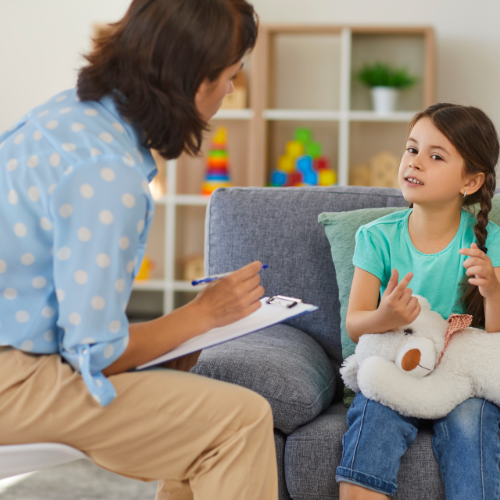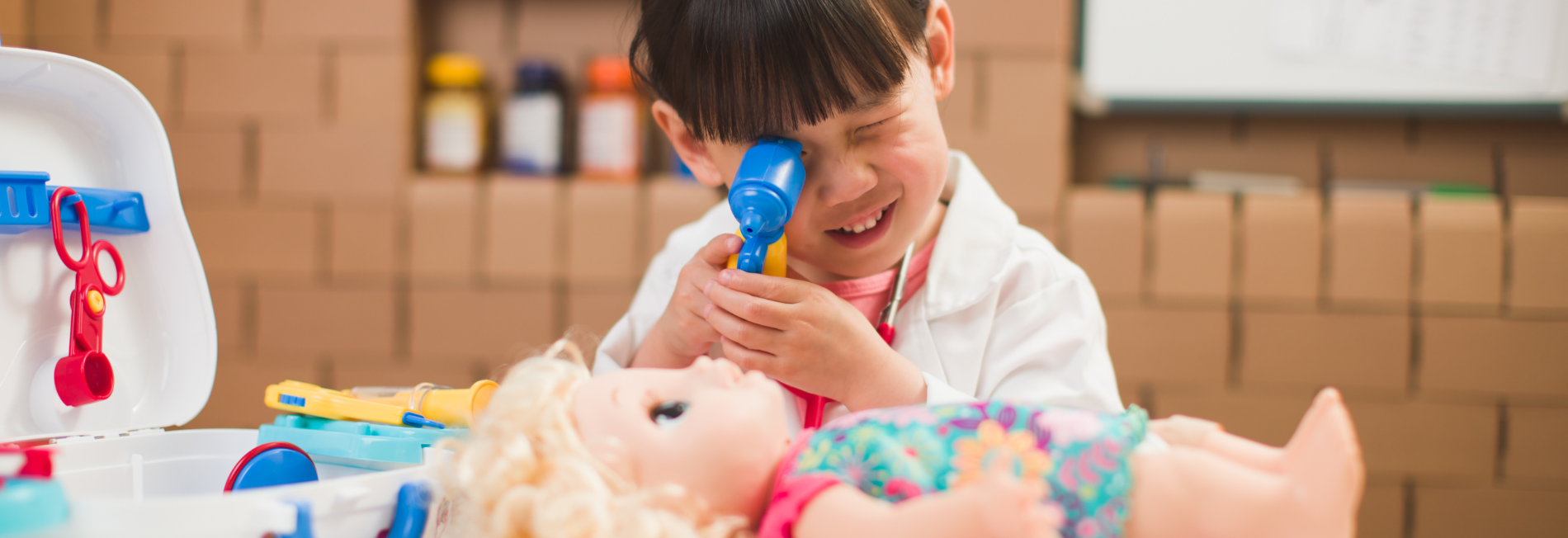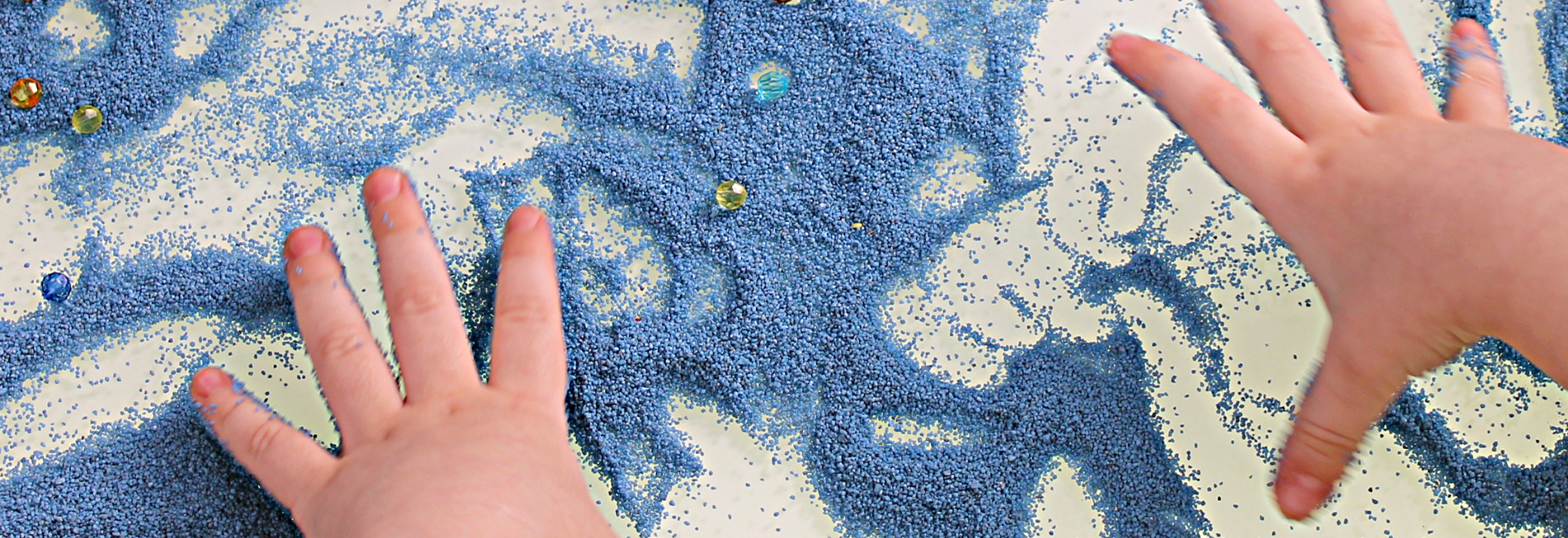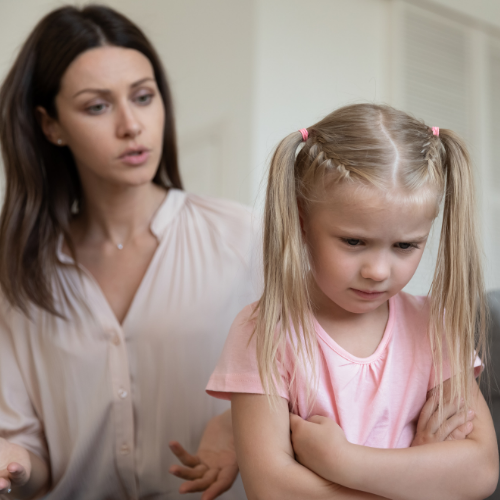Child & Adolescent Services
Empowering Young Minds To Flourish
Child and adolescent therapy services provide a specialized and compassionate approach to supporting the mental and emotional well-being of young individuals. These services are designed to address the unique challenges and developmental needs of children and adolescents, offering a safe and nurturing space where they can express their feelings, process difficult experiences, and develop coping strategies.
Child and adolescent therapists are trained to work with young clients to address a wide range of issues, including anxiety, depression, behavioral problems, trauma, school-related concerns, and family dynamics. Through age-appropriate therapeutic techniques, play therapy, and open communication, child and adolescent therapy services aim to empower young minds, foster resilience, and guide them toward a path of emotional well-being and personal growth.

Expert Guidance to Nurture Young Minds
ADHD Parents Support Group
ADHD Parents Support Group
SERVICES
ADHD Parents Support Group
Our ADHD Support Group is a collaborative gathering for parents and caregivers of children with Attention Deficit Hyperactivity Disorder (ADHD). Led by experienced professionals, this group provides a supportive environment to learn about ADHD, share experiences, and gain valuable resources to help your child thrive. The group focuses on understanding the science behind ADHD and equipping participants with practical strategies for managing symptoms and promoting positive development.
Get in Touch
![]()
Call us
(571) 645-2222


What is the ADHD Parents’ Support Group?
The ADHD Support Group for Parents and Caregivers is a specialized program designed to empower and educate those caring for children with ADHD. In this supportive environment, you can expect:
- Education: Learn about the latest scientific research on ADHD, including its causes, symptoms, and treatment options.
- Peer Support: Connect with other parents and caregivers who understand the unique challenges of raising a child with ADHD, reducing feelings of isolation and frustration.
- Resource Sharing: Gain access to a wealth of resources, including recommended books, websites, and local services that can support your child’s development.
- Skill Development: Acquire practical strategies for managing ADHD symptoms, improving communication, and fostering your child’s strengths.
- Expert Guidance: Benefit from the knowledge and experience of professionals specializing in ADHD management and child development.
- Emotional Support: Share your experiences in a non-judgmental environment, fostering emotional growth and resilience.
- Problem-Solving: Collaboratively work on finding solutions to common challenges faced by families affected by ADHD.
- Confidentiality: Participate in a safe and trustworthy environment where all members respect each other’s privacy.
Our ADHD Support Group addresses a wide range of topics, including medication management, behavioral interventions, educational accommodations, and social skills development. By participating in this group, you’ll gain the knowledge, skills, and support needed to navigate the complexities of ADHD and help your child reach their full potential.
How Does the ADHD Support Group Help?
The ADHD Support Group offers numerous benefits to parents and caregivers:
- Increased Understanding: Gain a deeper comprehension of ADHD, its impact on your child, and effective management strategies.
- Improved Parenting Skills: Learn and practice specific techniques for supporting your child’s unique needs, enhancing your parenting effectiveness.
- Reduced Stress: Share your experiences and challenges with others who understand, helping to alleviate stress and feelings of isolation.
- Access to Resources: Discover valuable resources and services that can support your child’s development and your family’s well-being.
- Enhanced Advocacy Skills: Learn how to effectively advocate for your child’s needs in educational and healthcare settings.
- Emotional Support: Receive empathy and encouragement from peers who are on similar journeys, fostering emotional resilience.
- Improved Family Dynamics: Gain insights into managing family relationships and promoting positive interactions with your child with ADHD.
- Networking Opportunities: Connect with other families and professionals in the ADHD community, building a supportive network.
- Empowerment: Develop confidence in your ability to support your child and navigate the challenges associated with ADHD.
Our ADHD Support Group provides a structured and supportive environment where parents and caregivers can learn, grow, and connect. By participating in this group, you’ll gain the knowledge, skills, and support needed to effectively manage ADHD symptoms, promote your child’s strengths, and foster a positive family dynamic.
Related Conditions
- ADHD
- Anger Management
- Anxiety
- Behavioral Issues
- Bipolar Disorder
- Chronic Impulsivity
- Coping Skills
- Depression
- Education and Learning Disabilities
- Emotional Dysregulation
- Life Coaching
- Life Transitions
- Parenting
- School Issues
- Stress
Expressive Therapy
Expressive Therapy
SERVICES
Expressive Therapy
Expressive therapy is a creative and arts-based approach to counseling and healing that allows individuals to communicate and explore their emotions, thoughts, and experiences through various forms of expression, such as art, music, dance, drama, and writing. This therapeutic method offers a non-verbal and non-judgmental space where individuals can tap into their inner feelings and gain insights into their psychological well-being. Expressive therapy can help individuals process trauma, manage stress, improve self-awareness, and enhance overall mental health and well-being by harnessing the power of artistic and creative expression as a therapeutic tool.
Get in Touch
![]()
Call us
(571) 645-2222


What is Expressive Therapy?
Expressive therapy is a form of psychotherapy that incorporates various creative and artistic modalities as therapeutic tools to help individuals explore and process their emotions, thoughts, and experiences. This approach goes beyond traditional talk therapy by using expressive mediums like art, music, dance, drama, writing, and movement to facilitate emotional expression and self-discovery.
In expressive therapy sessions, individuals are encouraged to engage in creative activities that allow them to communicate and reflect on their inner world. The process is typically non-judgmental and emphasizes self-expression rather than artistic skill. Therapists trained in expressive therapy techniques guide clients in using these creative outlets to gain insight, resolve emotional conflicts, reduce stress, and promote psychological healing.
Expressive therapy can be particularly effective for individuals who may have difficulty articulating their feelings verbally or who find traditional talk therapy challenging. It provides an alternative and often more accessible means of self-expression, leading to increased self-awareness, emotional regulation, and personal growth. This approach is used to address a wide range of emotional and mental health issues, including trauma, anxiety, depression, and self-esteem concerns.
Why is Expressive Therapy Used?
Expressive therapy is used to address a wide range of emotional, psychological, and mental health concerns, offering individuals a unique and powerful way to heal, grow, and enhance their well-being. It is used for several compelling reasons:
- Emotional Expression: It provides a creative and non-verbal outlet for individuals to express and process complex emotions, including those that may be challenging to articulate verbally.
- Self-Exploration: Expressive therapy encourages self-reflection and exploration, helping individuals gain deeper insights into their thoughts, feelings, and experiences.
- Trauma Recovery: It is effective in addressing trauma by allowing individuals to safely and gradually explore and process traumatic memories and emotions.
- Stress Reduction: Engaging in creative and artistic activities can be inherently relaxing and stress-reducing, promoting overall well-being.
- Enhanced Communication: It can improve communication skills, making it easier for individuals to express themselves and connect with others.
- Empowerment: Expressive therapy empowers individuals by providing them with tools for self-expression, problem-solving, and emotional regulation.
- Self-Esteem and Self-Confidence: Success in creative endeavors can boost self-esteem and self-confidence, promoting a more positive self-image.
- Coping Skills: It teaches healthy coping strategies, allowing individuals to manage stress, anxiety, and other emotional challenges more effectively.
- Personal Growth: Expressive therapy supports personal growth and development by fostering self-awareness, creativity, and resilience.
- Accessibility: It is accessible to people of all ages and abilities, making it a versatile and inclusive therapeutic approach.Cultural Sensitivity: Expressive therapy can be adapted to respect and incorporate diverse cultural backgrounds and traditions.



How Can Play Therapy Help?
Expressive therapy offers a wide range of benefits for individuals seeking emotional, psychological, and creative growth. Some of the key benefits include:
- Emotional Expression: Expressive therapy provides a safe and non-verbal means for individuals to express and process their emotions, even those that are difficult to put into words.
- Self-Exploration: It encourages self-reflection and self-discovery, allowing individuals to gain deeper insights into their thoughts, feelings, and experiences.
- Stress Reduction: Engaging in creative and artistic activities can be inherently relaxing and therapeutic, helping individuals manage stress and anxiety.
- Trauma Recovery: Expressive therapy can aid in processing and healing from trauma by providing a controlled and supportive environment for exploring traumatic memories and emotions.
- Enhanced Communication: It can improve communication skills, helping individuals express themselves more effectively and connect with others.
- Empowerment: Expressive therapy empowers individuals by giving them tools to cope with challenges, solve problems, and regulate their emotions.
- Self-Esteem and Self-Confidence: Success in creative endeavors can boost self-esteem and self-confidence, leading to a more positive self-image.
- Coping Skills: It teaches healthy coping strategies, enabling individuals to manage stress, anxiety, and other emotional difficulties.
- Personal Growth: Expressive therapy supports personal growth and development by fostering self-awareness, creativity, and resilience.
- Inclusivity: It can be adapted to accommodate individuals of all ages, abilities, and cultural backgrounds, making it a versatile and inclusive therapeutic approach.
- Artistic Expression: For those with a passion for the arts, expressive therapy provides an opportunity to harness creativity as a healing tool.
- Emotional Regulation: It can help individuals regulate and manage their emotions, leading to improved emotional well-being.
These benefits make expressive therapy a valuable and versatile approach for individuals seeking to enhance their mental and emotional well-being, develop coping skills, and foster personal growth.
Related Conditions
- ADHD
- Anger Management
- Anxiety
- Behavioral Issues
- Coping Skills
- Depression
- Divorce
- Domestic Abuse
- Domestic Violence
- Eating Disorders
- Education and Learning Disabilities
- Emotional Dysregulation
- Family Conflict
- Grief & Loss
- Life Coaching
- Life Transitions
- Peer Relationships
- Personality Disorders
- School Issues
- Self-Esteem
- Self-Harming
- Sexual Abuse
- Stress
- Trauma/PTSD
Have Questions?
Play Therapy
Play Therapy
SERVICES
Play Therapy
Play therapy is a specialized form of therapy designed primarily for children, although it can also be adapted for some adolescents and adults. It utilizes play as a means of communication, expression, and healing. During sessions, children engage in unstructured play activities to express and process emotions, helping them develop coping skills and address psychological and behavioral issues.
Get in Touch
![]()
Call us
(571) 645-2222


What is Play Therapy?
Play therapy is a therapeutic approach primarily designed for children. It utilizes play as a medium for them to express and work through their emotions, thoughts, and experiences. In a safe and supportive environment, children use toys, games, and creative activities to communicate and address psychological and emotional challenges, facilitating healing and personal growth. Play therapy is effective for a wide range of issues, including anxiety, trauma, behavioral problems, and more, providing a child-centric avenue for therapeutic intervention.
Why is Play Therapy Used?
Play therapy is a versatile and valuable approach to support children’s mental and emotional well-being, helping them navigate and overcome various challenges they may encounter. Play therapy is used for several important reasons:
- Child-Centric Communication: Children often lack the verbal and cognitive skills to express their emotions and experiences fully. Play allows them to communicate in a way that feels natural and comfortable.
- Emotional Expression: Play therapy provides a safe space for children to explore and express their emotions, including those related to trauma, grief, anxiety, or behavioral challenges.
- Problem-Solving: Through play, children can work through conflicts, dilemmas, and challenges they face, helping them develop problem-solving skills and resilience.
- Trauma Resolution: It is particularly effective in addressing traumatic experiences, as children can reenact and process difficult events in a controlled and supportive environment.
- Behavioral Improvement: Play therapy helps modify and improve problematic behaviors by addressing their underlying emotional causes and providing healthier coping mechanisms.
- Enhancing Self-Esteem: It can boost a child’s self-esteem and self-confidence as they gain a sense of mastery and control through play.
- Building Relationships: Play therapy often involves interactions with a therapist, which can help children build trust, improve social skills, and develop healthier relationships.



How Can Play Therapy Help?
Play therapy offers a range of benefits for patients experiencing emotional, behavioral, or psychological challenges. Some of these benefits include:
- Emotional Expression: Play therapy provides a safe and non-threatening outlet for children to express their emotions, helping them process and cope with difficult feelings.
- Enhanced Communication: Patients who struggle with verbal communication can convey their thoughts and experiences more effectively through play, improving their ability to express themselves.
- Problem-Solving Skills: Play therapy encourages children to work through conflicts, make decisions, and find solutions to challenges, promoting the development of problem-solving skills.
- Trauma Resolution: It is effective in helping patients process and recover from traumatic experiences, as they can reenact and explore their feelings related to the trauma within a controlled environment.
- Behavioral Improvement: Play therapy addresses the root causes of problematic behaviors, leading to positive changes in behavior as children gain healthier coping strategies.
- Self-Esteem and Self-Confidence: As children achieve goals and make choices during play therapy, they experience a sense of accomplishment, which can boost self-esteem and self-confidence.
- Enhanced Coping Skills: Children learn new ways to cope with stress, anxiety, and other challenging emotions, helping them build resilience.
- Improved Relationships: Through interactions with a therapist, children can develop trust, improve social skills, and enhance their ability to form positive relationships.
- Personal Growth: Play therapy supports personal growth and development by fostering self-awareness and self-acceptance.
- Long-Term Well-being: The skills and insights gained in play therapy often have a lasting, positive impact on a patient’s overall mental and emotional well-being.
Related Conditions
- ADHD
- Anger Management
- Anxiety
- Behavioral Issues
- Coping Skills
- Depression
- Divorce
- Domestic Abuse
- Domestic Violence
- Eating Disorders
- Education and Learning Disabilities
- Emotional Dysregulation
- Family Conflict
- Grief & Loss
- Life Coaching
- Life Transitions
- Peer Relationships
- Personality Disorders
- School Issues
- Self-Esteem
- Self-Harming
- Sexual Abuse
- Stress
- Trauma/PTSD
Have Questions?
Sandplay Therapy
Sandplay Therapy
SERVICES
Sandplay Therapy
Sandplay therapy is a therapeutic approach where clients use a tray of sand and miniature figures or symbols to express and explore their emotions, thoughts, and experiences. This non-verbal, symbolic method helps uncover and address unconscious issues and promote healing, guided by a trained therapist. It’s effective for a variety of emotional and psychological challenges.
Get in Touch
![]()
Call us
(571) 645-2222


What is Sandplay Therapy?
Sandplay therapy, often referred to as Sand Tray Therapy or Sandtray Therapy, is a therapeutic modality that utilizes a tray of sand and miniature figurines or objects to facilitate self-expression, exploration, and healing.
Sandtray Therapy is adaptable and can be used with individuals of all ages. It has been found effective in addressing a wide range of emotional and psychological issues, including trauma, grief, anxiety, depression, and relationship challenges. This modality harnesses the creative and symbolic power of the imagination to facilitate deep self-discovery and emotional healing.
Why is Sandplay Therapy Used?
Play therapy is used for several important reasons:
- Self-Expression: It provides a non-verbal means for clients to express and explore their thoughts, emotions, and experiences, making it particularly helpful for those who find it challenging to communicate verbally.
- Symbolic Exploration: Clients use miniature figures and objects to create symbolic representations of their inner world, allowing them to gain insight into their unconscious thoughts and emotions.
- Healing and Self-Discovery: This therapy is a powerful tool for resolving inner conflicts, processing trauma, and promoting personal growth and emotional healing.
- Support for Various Issues: It can effectively address a wide range of emotional and psychological issues, including trauma, grief, anxiety, depression, relationship challenges, and more.
- Non-Directive Approach: Sandplay therapy is non-directive, meaning clients have the freedom to explore their inner world at their own pace and in their own way, guided by a trained therapist.
Sandplay therapy offers a safe and creative space for clients to express themselves, explore their unconscious mind, and work toward personal growth and healing. It taps into the power of symbolism and imagination to facilitate therapeutic change and self-discovery.
How Can Play Therapy Help?
Sandplay therapy offers a range of benefits for patients experiencing emotional, behavioral, or psychological challenges. Some of these benefits include:
- Emotional Release: Sandplay offers a safe outlet for releasing and processing suppressed or deeply buried emotions.
- Conflict Resolution: Clients can explore and work through inner conflicts, traumas, and unresolved issues.
- Self-Discovery: It fosters self-discovery, helping individuals gain insight into their emotions, needs, and personal growth potential.
- Healing and Integration: Sandplay therapy promotes emotional and psychological well-being by integrating aspects of the self that were previously fragmented.
- Empowerment: Clients feel empowered to take an active role in their therapeutic journey and personal growth.
- Greater Emotional Regulation: Sandplay can lead to improved emotional regulation and the ability to manage intense feelings more effectively.
These benefits collectively contribute to emotional healing, self-awareness, personal growth, and an increased sense of well-being in individuals who undergo Sandplay Therapy. It provides a safe and supportive space for self-exploration, allowing clients to make significant strides in their therapeutic journey.
Related Conditions
- ADHD
- Anger Management
- Anxiety
- Behavioral Issues
- Coping Skills
- Depression
- Divorce
- Domestic Abuse
- Domestic Violence
- Eating Disorders
- Education and Learning Disabilities
- Emotional Dysregulation
- Family Conflict
- Grief & Loss
- Life Coaching
- Life Transitions
- Peer Relationships
- Personality Disorders
- School Issues
- Self-Esteem
- Self-Harming
- Sexual Abuse
- Stress
- Trauma/PTSD
Have Questions?
Trauma-Focused Integrated Play Therapy
Trauma-Focused Integrated Play Therapy
SERVICES
Trauma-Focused Integrated Play Therapy
Trauma-Focused Integrated Play Therapy (TF-IPT) is a specialized, holistic program designed to provide a caring and structured therapeutic experience for children who have endured the challenges of abuse or trauma. The use of TF-IPT creates a safe space where a child can naturally express their complex emotions and experiences through play, helping them process and heal from traumatic events. A specially trained therapist works with the child to facilitate posttraumatic play, a spontaneous form of play that helps children gradually process their traumatic experiences.
Get in Touch
![]()
Call us
(571) 645-2222


What is Trauma-Focused Integrated Play Therapy?
Trauma-Focused Integrated Play Therapy (TF-IPT) is a comprehensive program that blends directive and nondirective methods to offer structured and goal-oriented therapy for children who have been victims of trauma, such as sexual abuse, physical abuse, neglect, or witnessing domestic violence.
TF-IPT takes into account the developmental needs of young children and draws from both scientific research and practical insights, incorporating evidence-based practices that are currently available. Its primary aim is to facilitate the resolution of traumatic experiences through both direct and indirect processing of these events. The TF-IPT approach involves:
- Comprehensive Assessment: Therapist begins by understanding the child’s unique experience of trauma and the impact it has had on them. This assessment serves as the foundation for tailored treatment.
- Identifying Trauma-Related Symptoms: The therapist aims to identify and address trauma-related symptoms that the child may be experiencing, which can include anxiety, depression, or behavioral challenges.
- Exploring Emotions and Thoughts: The sessions provide a safe and nurturing space for children to explore and express their emotions and thoughts surrounding their experiences of abuse through play, enabling them to process these feelings effectively.
- Enhancing Coping Strategies: The therapist uses TF-IPT methods to equip children with coping strategies and self-regulation skills to help them regain their pre-abuse level of functioning, promoting emotional resilience.
- Access to Resources: The therapist ensures that children have access to both internal and external resources, enabling them to draw on their strengths and the support of their caregivers and community.
- Boosting Self-Esteem: The therapy session have a significant focus on enhancing a child’s self-esteem and sense of competence. Through positive experiences in therapy, children can rebuild their self-worth and confidence.
This therapeutic model places a strong emphasis on promoting nondirective play therapy, which often enables children to naturally engage in posttraumatic play. Posttraumatic play is a spontaneous and unique form of play that tends to emerge in young children who have experienced psychological trauma. It serves as a child’s organic way of gradually introducing exposure, forming narratives, and processing their traumatic experiences.
One distinctive aspect of this approach is its incorporation of other therapy techniques, such as play, expressive, and sandplay techniques, as valuable therapeutic components in their own right. These techniques are not solely used for engaging or teaching children or achieving other goals; instead, they are recognized as potent tools for therapeutic healing.
By addressing these goals in a compassionate and child-centered manner, TF-IPT empowers children to heal from the trauma of abuse, develop essential coping skills, rebuild their self-esteem, and regain a sense of control over their lives. This therapeutic approach supports them in their journey towards recovery and emotional well-being.
Why is TF-IPT Used?
Our therapists may determine that Trauma-Focused Integrated Play Therapy (TF-IPT) is the best approach for for several crucial reasons:
- Addressing Trauma: TF-IPT is specifically designed to address the emotional and psychological effects of trauma in children. It helps them process and heal from the trauma they’ve experienced.
- Child-Centered Approach: TF-IPT recognizes the unique needs of children and uses a developmentally appropriate, child-centric approach to therapy.
- Safe Emotional Expression: Through play and creative activities, TF-IPT provides a safe and non-threatening way for children to express and explore their thoughts and feelings, which can be challenging to communicate verbally.
- Symptom Reduction: It is effective in reducing trauma-related symptoms such as anxiety, depression, and behavioral issues, providing relief to children and improving their overall well-being.
- Coping Skills: TF-IPT equips children with coping strategies and self-regulation skills, helping them manage stress and challenges in their lives.
- Rebuilding Self-Esteem: The therapy focuses on rebuilding a child’s self-esteem and sense of competence, promoting a positive self-image.
- Empowerment: TF-IPT empowers children to regain a sense of control over their emotions and lives, fostering resilience and self-confidence.
- Family and Community Involvement: It encourages the involvement of caregivers and external support systems, creating a supportive network around the child.
- Positive Experiences: TF-IPT allows children to have positive and supportive therapeutic experiences, counterbalancing the negative experiences associated with trauma.
- Developmentally Appropriate: TF-IPT is tailored to the developmental needs of children, ensuring that interventions are suitable for their age and emotional maturity.
In essence, our therapists may use TF-IPT to support children in their journey of healing from trauma, promoting emotional well-being, and helping them develop the necessary skills to navigate life’s challenges.
How Can TF-IPT Help?
Trauma-Focused Integrated Play Therapy (TF-IPT) offers a range of benefits for children who have experienced trauma:
- Healing from Trauma: TF-IPT provides a structured and nurturing environment for children to process and heal from the effects of trauma, allowing them to gradually overcome its emotional impact.
- Emotional Expression: Through play and therapeutic activities, children can express and explore their emotions, thoughts, and experiences in a safe and non-threatening manner.
- Symptom Reduction: TF-IPT is effective in reducing trauma-related symptoms, including anxiety, depression, and behavioral issues, enabling children to experience emotional relief.
- Coping Skills: Children learn and develop coping strategies and self-regulation skills, enhancing their ability to manage stress and challenges in daily life.
- Improved Self-Esteem: TF-IPT focuses on rebuilding a child’s self-esteem and sense of competence, promoting a more positive self-image.
- Empowerment: Children regain a sense of control over their lives and emotions, allowing them to move forward with greater resilience and confidence.
- Enhanced Communication: TF-IPT can improve a child’s communication skills, both verbal and non-verbal, which can benefit their relationships and overall well-being.
By addressing the therapeutic goals and fostering a compassionate and child-centric approach, a therapist may use TF-IPT to empower children to heal, develop emotional resilience, and experience an overall improvement in their emotional and psychological well-being.
Related Conditions
- Anger
- Anxiety
- Behavioral Issues
- Depression
- Divorce
- Emotional Dysregulation
- Grief & Loss
- Family Conflict
- Life Transitions
- School Issues
- Self-Esteem
- Stress
- Trauma/PTSD
Have Questions?
Family Therapy
Family Therapy
SERVICES
Family Therapy
Family therapy, or family counseling, is a type of therapy that focuses on the whole family. It’s a place where families can safely explore their issues, improve how they communicate, and learn to understand each other better. A skilled therapist guides the process, helping families build stronger relationships and a more positive home environment.
Get in Touch
![]()
Call us
(571) 645-2222

What is Family Therapy?
Family therapy, also known as family counseling, is a specialized form of psychotherapy that focuses on improving the dynamics and relationships within a family unit. In family therapy, a trained therapist works with family members collectively to address a wide range of issues, conflicts, and challenges that affect the family as a whole or its individual members. The therapy process provides a safe and structured space for open communication, conflict resolution, and the exploration of family roles and patterns.
The goal of family therapy is to enhance understanding, promote healthier communication, strengthen emotional bonds, and empower families to work together as a more functional and supportive unit. It can be beneficial for families facing issues such as communication breakdowns, conflicts between parents and children, major life transitions, marital or financial problems, behavioral problems in children or adolescents, and other relational or psychological challenges. Family therapy aims to improve the overall well-being and functioning of the family system.

When Is Family Therapy Needed?
Family therapy is needed whenever family dynamics, relationships, or individual family members are facing challenges that impact their emotional well-being and functioning as a unit. It provides a compassionate and structured approach to address these issues collaboratively, promoting healing, understanding, and positive change within the family system. It can be used for various reasons, including:
- Communication Breakdown: Families may experience difficulties in effectively communicating with each other, leading to misunderstandings, conflicts, and emotional distance.
- Conflict Resolution: Family therapy provides a structured and neutral environment to address conflicts and disagreements within the family, helping members develop healthier ways to resolve issues.
- Major Life Transitions: Significant life events such as divorce, remarriage, the birth of a child, or the loss of a loved one can disrupt family dynamics, necessitating support and guidance.
- Behavioral Issues: Children and adolescents may exhibit behavioral problems that impact the family. Family therapy can help identify and address these issues collectively.
- Substance Abuse or Addiction: When a family member struggles with substance abuse or addiction, family therapy can assist in the recovery process and help the family heal.
- Mental Health Challenges: Family therapy can provide support when one or more family members are dealing with mental health issues such as depression, anxiety, or bipolar disorder.
- Blended Families: Families that merge due to remarriage may encounter challenges in adjusting to new family roles and dynamics.
- Parent-Child Relationships: Family therapy can help parents and children build stronger, more positive relationships and improve parenting skills.
- Crisis or Trauma: Families coping with a crisis or traumatic event, such as a natural disaster, accident, or loss, can benefit from therapy to process their experiences and strengthen their resilience.
- Preventative Maintenance: Families may engage in therapy proactively to strengthen their communication, resolve minor issues, and build a more cohesive family unit.
- Cultural and Generational Conflicts: Differences in cultural or generational values and beliefs can lead to conflicts within a family, which can be addressed in therapy.



How Can Family Therapy Help?
Family therapy is needed whenever family dynamics, relationships, or individual family members are facing challenges that impact their emotional well-being and functioning as a unit. It provides a compassionate and structured approach to address these issues collaboratively, promoting healing, understanding, and positive change within the family system. It can be used for various reasons, including:
- Communication Breakdown: Families may experience difficulties in effectively communicating with each other, leading to misunderstandings, conflicts, and emotional distance.
- Conflict Resolution: Family therapy provides a structured and neutral environment to address conflicts and disagreements within the family, helping members develop healthier ways to resolve issues.
- Major Life Transitions: Significant life events such as divorce, remarriage, the birth of a child, or the loss of a loved one can disrupt family dynamics, necessitating support and guidance.
- Behavioral Issues: Children and adolescents may exhibit behavioral problems that impact the family. Family therapy can help identify and address these issues collectively.
- Substance Abuse or Addiction: When a family member struggles with substance abuse or addiction, family therapy can assist in the recovery process and help the family heal.
- Mental Health Challenges: Family therapy can provide support when one or more family members are dealing with mental health issues such as depression, anxiety, or bipolar disorder.
- Blended Families: Families that merge due to remarriage may encounter challenges in adjusting to new family roles and dynamics.
- Parent-Child Relationships: Family therapy can help parents and children build stronger, more positive relationships and improve parenting skills.
- Crisis or Trauma: Families coping with a crisis or traumatic event, such as a natural disaster, accident, or loss, can benefit from therapy to process their experiences and strengthen their resilience.
- Preventative Maintenance: Families may engage in therapy proactively to strengthen their communication, resolve minor issues, and build a more cohesive family unit.
- Cultural and Generational Conflicts: Differences in cultural or generational values and beliefs can lead to conflicts within a family, which can be addressed in therapy.
Related Conditions
- Addiction
- ADHD
- Alcohol Use
- Anger Management
- Antisocial Personality
- Anxiety
- Behavioral Issues
- Chronic Impulsivity
- Codependency
- Coping Skills
- Depression
- Divorce
- Domestic Abuse
- Domestic Violence
- Drug Abuse
- Family Conflict
- Grief & Loss
- Infidelity
- LGBTQ+ Issues
- Life Coaching
- Life Transitions
- Marital and Premarital
- Mood Disorders
- Parenting
- Peer Relationships
- Personality Disorders
- Pregnancy, Prenatal, Postpartum
- Racial Identity
- Relationship Issues
- School Issues
- Self-Esteem
- Self-Harming
- Sexual Abuse
- Spirituality
- Stress
- Substance Use
- Suicidal Ideation
- Trauma/PTSD
- Women’s Issues
Have Questions?
Parent-Child Interaction Therapy
Parent-Child Interaction Therapy
SERVICES
Parent-Child Interaction Therapy
Parent-Child Interaction Therapy (PCIT) is a specialized therapy for young children (ages 2-7) with behavioral and emotional challenges. It focuses on improving the parent-child relationship by teaching parents specific techniques for reinforcing positive behaviors and managing challenging behaviors effectively. PCIT is often used to address issues such as aggression, defiance, attention-deficit/hyperactivity disorder (ADHD), conduct disorders, and other behavioral problems in young children. It is typically a short-term therapy that aims to improve the parent-child relationship, enhance parenting skills, and reduce problematic behaviors in the child. PCIT is conducted in a controlled, therapeutic environment, with the therapist observing and providing guidance to parents as they interact with their child.
Get in Touch
![]()
Call us
(571) 645-2222


What is PCIT?
Parent-Child Interaction Therapy (PCIT) is a specialized form of therapy designed to provide support and guidance to young children facing behavioral and emotional challenges. It places a strong emphasis on nurturing the parent-child relationship, recognizing the profound impact it has on a child’s well-being. Through PCIT, parents are equipped with valuable strategies to improve their child’s behavior, enhance their communication, and strengthen the bonds of love and trust. This therapy is a beacon of hope for families dealing with issues like aggression, defiance, and conduct disorders in their little ones. With the gentle guidance of trained therapists, parents find the tools and confidence they need to help their child thrive and embrace a brighter future together.
This therapy is typically conducted by trained therapists and involves two main components:
- Child-Directed Interaction (CDI): In this phase, parents learn to improve their child’s behavior by providing positive attention and reinforcement. They use specific play and communication techniques to enhance the parent-child bond and encourage desired behaviors.
- Parent-Directed Interaction (PDI): In this phase, parents learn strategies to manage their child’s challenging behaviors more effectively. They are taught techniques for setting appropriate boundaries and consequences, improving communication, and reducing negative behaviors.
Why is PCIT Used?
Parent-Child Interaction Therapy (PCIT) is used for several important reasons:
- Behavioral and Emotional Challenges: PCIT is employed to address the behavioral and emotional challenges that young children may face, such as aggression, defiance, conduct disorders, and attention difficulties.
- Strengthening the Parent-Child Relationship: This therapy places a strong focus on enhancing the parent-child relationship. It is used to repair and strengthen bonds between parents and their children, which are crucial for healthy emotional development.
- Parenting Skills: PCIT equips parents with effective parenting skills and techniques. It empowers them to manage their child’s behavior and emotions, improve communication, and set appropriate boundaries.
- Reducing Negative Behaviors: By teaching parents how to interact with their children in positive and constructive ways, PCIT aims to reduce challenging or disruptive behaviors and replace them with healthier alternatives.
- Early Intervention: PCIT is often employed as an early intervention strategy to address behavioral issues in young children, helping prevent these issues from escalating as the child grows.
- Improving Emotional Well-Being: PCIT is used to improve the emotional well-being of both parents and children. It provides families with the tools and strategies they need to create a loving and supportive home environment.
The therapy is provided by trained therapists who guide parents through the process, offering empathy and support as they work to enhance the parent-child relationship and create positive changes in the child’s behavior and emotional health.
How Can PCIT Help?
PCIT offers a holistic approach that benefits both parents and children. It provides the tools and support needed to create a more harmonious and loving family environment, leading to improved emotional well-being for all involved. Some of these benefits for your child include:
- Reduced Defiance: PCIT can help reduce defiant behaviors in children, making them more receptive to parental guidance and less likely to resist rules and requests.
- Decreased Aggression: Children who exhibit aggressive behaviors may experience a reduction in physical or verbal aggression through PCIT, leading to a more harmonious family environment.
- Improved Communication: PCIT encourages better communication between parents and children, which can lead to less frustration and more effective problem-solving.
- Enhanced Cooperation: Children are likely to become more cooperative and willing to participate in daily routines and activities, which can reduce stress within the family.
- Increased Attention and Compliance: PCIT teaches children to pay attention to parental instructions and follow through with tasks and responsibilities.
- Improved Social Skills: Children may develop better social skills, leading to improved interactions with peers and adults outside the family.
- Reduced Attention-Seeking Behaviors: Children may reduce negative attention-seeking behaviors and learn to seek positive attention instead.
- Greater Emotional Regulation: Through PCIT, children can develop improved emotional regulation, enabling them to manage their feelings more effectively.
- Better Coping Strategies: PCIT can equip children with healthier coping strategies, allowing them to deal with stress, frustration, and challenges in a more constructive manner.
- Enhanced Self-Esteem: As parents use positive reinforcement and praise, children may experience an increase in self-esteem and self-confidence.
- Resilience: Through positive reinforcement and coping strategies, PCIT helps children build emotional resilience and adaptability.
Related Conditions
- ADHD
- Anger Management
- Antisocial Personality
- Anxiety
- Behavioral Issues
- Coping Skills
- Depression
- Divorce
- Education and Learning Disabilities
- Emotional Dysregulation
- Family Conflict
- Grief & Loss
- Life Coaching
- Life Transitions
- Mood Disorders
- Oppositional Defiance Disorder (ODD)
- Parenting
- Peer Relationships
- Personality Disorders
- School Issues
- Self-Esteem
- Stress
- Trauma/PTSD
Have Questions?
Kids Play Therapy Group
Kids Play Therapy Group
SERVICES
Kids Play Therapy Group
Kids Play Therapy Group is a specialized form of therapy for children aged 4 to 12. It uses play-based activities and peer interactions in a structured and supportive environment to help children express emotions, develop social skills, and address behavioral or emotional issues. A trained therapist guides the sessions, fostering a safe and trusting atmosphere for children to explore their feelings and challenges.
Get in Touch
![]()
Call us
(571) 645-2222

What is Kids Play Therapy Group?
Kids Play Therapy Group therapy is a specialized therapeutic approach designed for children, typically between the ages of 4 to 12 years old. It combines play therapy techniques with a group setting to address emotional, social, and behavioral issues in a supportive and interactive environment. In this type of therapy:
- Play-Based Interventions: Children engage in various forms of play, including creative arts, games, and imaginative activities, as a means of self-expression and communication. Play is the natural language of children and serves as a medium through which they can explore and express their emotions and experiences.
- Peer Interaction: Children interact with their peers within the group, allowing them to practice social skills, build friendships, and develop a sense of belonging.
- Emotional Expression: Through play, children can express and process complex emotions, traumas, and conflicts that may be challenging to articulate verbally.
- Skill Development: Play therapy group sessions often incorporate structured activities that help children develop essential life skills, such as problem-solving, emotional regulation, and communication skills.
- Therapist Guidance: A trained play therapist or counselor facilitates the group, guiding and supporting children as they engage in play activities. The therapist observes, interprets, and responds to the children’s play behavior to gain insights into their emotional and psychological well-being.
- Safety and Trust: The group setting is designed to be safe, non-judgmental, and trusting, allowing children to explore their thoughts and feelings without fear of criticism.
- Focused Goals: Play therapy group sessions may target specific goals, such as improving self-esteem, managing anxiety, coping with family changes (e.g., divorce or loss), addressing behavioral issues, or building social skills.
- Parent Involvement: In some cases, parents may be involved in parallel parent support groups or included in specific sessions to learn about their child’s progress and gain guidance on how to support their child’s therapeutic journey.
Kids Play Therapy Group is effective in helping children process emotions, improve social skills, and develop coping mechanisms. It is particularly beneficial for children who may struggle to express themselves verbally or who face challenges related to trauma, anxiety, behavioral issues, or adjustment difficulties. By integrating play and peer interaction, this therapeutic approach supports children in building emotional resilience and enhancing their overall well-being.

How Does Kids Play Therapy Group Help?
Kids Play Therapy Group therapy is effective in helping children process emotions, build social skills, develop self-confidence, and address behavioral or emotional challenges. It provides a structured and supportive environment for children to enhance their emotional and social well-being, and helps in several ways:
- Emotional Expression: Children use play as a means to express complex emotions, traumas, or challenges they may find difficult to articulate verbally.
- Social Skills: Interaction with peers in a group setting allows children to practice and develop essential social skills, including communication, cooperation, and conflict resolution.
- Behavioral Improvement: Structured play activities help children learn and practice new behaviors and coping strategies, reducing problematic behaviors.
- Self-Confidence: As children engage in play and achieve goals within the group, they often experience an increase in self-esteem and self-confidence.
- Emotional Regulation: Play therapy helps children learn to manage their emotions and develop healthier ways of coping with stress and anxiety.
- Problem-Solving: Children gain problem-solving skills as they navigate various play scenarios, promoting critical thinking and decision-making abilities.
- Supportive Environment: The group setting provides a safe, non-judgmental space for children to explore their thoughts and feelings, fostering a sense of trust and emotional security.
Parents may be included in the therapy process, either through parallel support groups or specific sessions, to gain insight into their child’s progress and learn how to support their child’s emotional development. It allows parents to actively participate in their child’s therapeutic journey, reinforces therapeutic principles outside of group sessions, and strengthens the parent-child relationship. This collaborative approach often leads to more positive outcomes for the child.
Related Conditions
- ADHD
- Anger Management
- Anxiety
- Behavioral Issues
- Coping Skills
- Depression
- Domestic Abuse
- Domestic Violence
- Divorce
- Education and Learning Disabilities
- Emotional Dysregulation
- Family Conflict
- Grief & Loss
- Life Coaching
- Life Transitions
- Mood Disorders
- Peer Relationships
- School Issues
- Self-Esteem
- Self-Harming
- Sexual Abuse
- Stress
- Trauma/PTSD
Have Questions?
Lorem ipsum dolor sit amet, consectetur adipiscing elit. Ut elit tellus, luctus nec ullamcorper mattis, pulvinar dapibus leo.
Lorem ipsum dolor sit amet, consectetur adipiscing elit. Ut elit tellus, luctus nec ullamcorper mattis, pulvinar dapibus leo.
